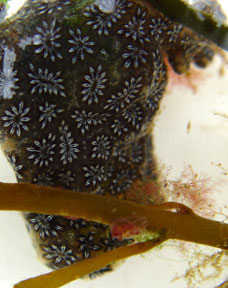 |
 |
|||||||||||||||
|
The image above illustrates what a colony of tunicates looks like. Each individual has distinct white spots arranged in a star shape. This species, Botryllus schlosseri, is commonly known as the golden star tunicate. This tunicate is not native to Maine and is considered an invasive species. Tunicates get their name from the tough, leathery outer "tunic" or covering membrane of body tissue. Tunicates are all sessile (non-moving or staying in one place) as adults. Tunicates feed by drawing water in through the inhalant siphon by moving their cilia. This water passes through the pharynx where small particles are filtered out, it then leaves through the exhalent siphon. |
||||||||||||||||
Did you know... |
||||||||||||||||
|
||||||||||||||||

